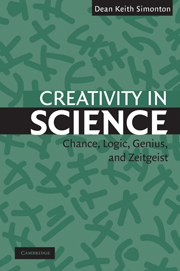Book contents
- Frontmatter
- Contents
- Preface
- Mathematical Notation
- Chapter 1 Introduction: Scientific Creativity
- Chapter 2 Creative Products
- Chapter 3 Combinatorial Processes
- Chapter 4 Scientific Activity
- Chapter 5 Creative Scientists
- Chapter 6 Scientific Discovery
- Chapter 7 Consolidation: Creativity in Science
- References
- Index
Chapter 3 - Combinatorial Processes
Published online by Cambridge University Press: 05 June 2012
- Frontmatter
- Contents
- Preface
- Mathematical Notation
- Chapter 1 Introduction: Scientific Creativity
- Chapter 2 Creative Products
- Chapter 3 Combinatorial Processes
- Chapter 4 Scientific Activity
- Chapter 5 Creative Scientists
- Chapter 6 Scientific Discovery
- Chapter 7 Consolidation: Creativity in Science
- References
- Index
Summary
From time to time creative scientists provide introspective reports about the mental processes underlying their discoveries. These self-observations can lay the foundation of a theoretical explanation for the phenomena reviewed in the preceding chapter. Take, for example, the following description Hermann von Helmholtz (1891/1898) offered regarding his own problem-solving triumphs:
I only succeeded in solving such problems after many devious ways, by the gradually increasing generalisation of favourable examples, and by a series of fortunate guesses. I had to compare myself with an Alpine climber, who, not knowing the way, ascends slowly and with toil, and is often compelled to retrace his steps because his progress is stopped; sometimes by reasoning, and sometimes by accident, he hits upon traces of a fresh path, which again leads him a little further; and finally, when he has reached the goal, he finds to his annoyance a royal road on which he might have ridden up if he had been clever enough to find the right starting-point at the outset. In my memoirs I have, of course, not given the reader an account of my wanderings, but I have described the beaten path on which he can now reach the summit without trouble.
(p. 282)This report clearly describes a process far removed from step-by-step logical analysis. Yet, it is no less distant from the mythical image of the scientific genius who conjures up great ideas by some effortless act of inspiration or flash of insight.
- Type
- Chapter
- Information
- Creativity in ScienceChance, Logic, Genius, and Zeitgeist, pp. 40 - 75Publisher: Cambridge University PressPrint publication year: 2004



